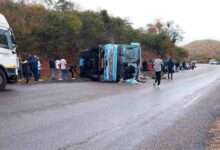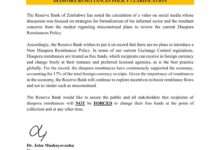Zimbabwean Flee To Their Rural Homes For The 21 Day Lockdown

Thousand of food insecure families in Harare and other cities and towns yesterday flocked to their rural homes after failing to stock up enough food supplies to last them until the end of the 21-day national lockdown which came into effect last night.
Fears, however, abound that the urban-rural migration could further spread COVID-19 to the country’s marginalised communities.
Most major bus terminuses in Harare, Bulawayo, Mutare and Masvingo were packed with rural-bound travellers rushing to beat the midnight deadline of the lockdown announced by President Emmerson Mnangagwa on Friday.
Several people who spoke to NewsDay said they had no choice, but to spend the three-week shutdown in their rural areas, where there were better chances of getting food and water supplies while the possibility of contracting the deadly disease is minimal because of the low concentration of people.
So far, Zimbabwe has had seven confirmed cases in Harare and Victoria and one death.
“It is not that easy to migrate to Chiredzi. I live in a one-roomed house with my three children and to keep social distance might not be easy, hence I am opting for my village,” said Chenai Moyo of Mbare hostels as she waited for her Chiredzi-bound bus.
Another traveller, Joseph Mhembere, said:“My company has closed and I am not sure if we are going to receive this month’s salary. I decided to move to my rural home in Gokwe so that my children won’t suffer from hunger. I cannot survive this lockdown period without any financial help.”
A visit to Entumbane and Renkini bus terminuses in Bulawayo showed that many people were boarding rural-bound buses despite bus crews having taken advantage of the high demand to hike fares.
Takesure Chitauro, a driver at Inter Africa buses, said they had increased the number of buses that ply most rural rtes to cater for the swelling number of passengers.
“Today, we had seven buses going to Chiredzi and they were all full. People are fleeing the city saying there is coronavirus and we are happy today that we have managed to capitalise on our profits,” he said.
At Sakubva in Mutare, transport operators recorded brisk business as people jostled to get transport to their respective rural homes.
Operators who spoke to NewsDay said people were still waiting for transport to Nyanga, Chipinge, Chimanimani and Nyanyadzi by late evening yesterday.
Several bus operators who increased bus fares were charging between US$10 and US$15 or $300 to Chiredzi up from $240.
Harare-Kwekwe operators pegged fares at US$10, up from ZWL$60.
Zimbabwe Nurses Association president Enock Dongo said migrating to rural posed a fresh challenge.
“It is unfortunate that people decided to migrate to rural areas. It will be a disaster countrywide. We have been urging the government to equip all hospitals with the protective measure for coronavirus, but it did not listen.
People in rural areas do not have information on how to protect themselves from infected persons. You cannot greet your old parents with an elbow, they do not understand that,” he said.
“The whole logic of 21 days lockdown means that coronavirus symptoms develop after 14 days and if you have it, it will develop within the 21 days while in lockdown. The tracking of contacts will be easy, but now if you go to rural areas with it, but not knowing your status, you can infect the whole village and it will be a big disaster since the government does not have capacity at the moment.”
Community Working Group on Health executive director Itai Rusike said testing for COVID-19 should be stepped up so that infected people take measures to avoid infecting others, or to get the care they need and to help authorities take action to slow it.
“Indeed, official statistics shows that we only have seven COVID-19 confirmed cases and one death for a population of about 15 million. The real numbers may be higher than this if we increase and widen our testing capacity, hence some people may be moving around spreading the disease unknowingly and, unfortunately, the people in the rural areas can become collateral damage due to the mass movement of people to their rural homes in the last few days in an effort to beat the total lockdown that is likely to have a bigger impact on those in urban areas compared to their rural counterparts.”
MDC secretary for labour Gideon Shoko said government should have consulted workers before enforcing the lockdown to avert starvation.
“While the lockdown decision is welcome, the challenge now to the working class both formal and informal, is … with their meagre wages and salaries, workers must buy adequate food rations, pay their rentals, rates, water, funeral insurances etc, but alas this is impossible,” he said.
“So far, nothing tangible has been put in place to have safety nets for the poor workers. This means that they are going to be on lockdown with nothing to support their families.
“Certainly, if this was a responsible government elected and answerable to the masses, it would have cared to consult stakeholders at the Tripartite Negotiating Forum on how the needs of the workforce would be taken care of during these trying times.”
Ibhetshu lika Zulu party secretary-general Mbuso Fuzwayo said: “Lockdown is good, but there was no adequate planning. Nothing is said about those vulnerable on the streets. With our failing economy, we need days to prepare for the lockdown. (There is) little information to those in the periphery and those who survive on food handouts from food agencies. Nothing has been out in place on how they will access their allocation.”
However, on Saturday, government said distribution of food aid would continue during the lockdown.
“The distribution of food aid will continue. However, distribution points will be increased in order to minimise large gatherings,” Information minister Monica Mutsvangwa said after an inter-ministerial taskforce on COVID-19.
“At the moment, grain and monetary payments are being made to 760 000 households throughout the country.”
Contacted for comment, Health minister Obadiah Moyo asked the NewsDay to forward questions to the ministry’s public relations department. Health ministry permanent secretary Agnes Mahomva was not reachable on her mobile phone.
In a statement, World Health Organisation director-general Tedros Adhanom Ghebreyesus yesterday said lockdowns on their own would not extinguish the epidemics, but just reduce pressure on health systems.
“Asking people to stay at home and shutting down population movement is buying time and reducing the pressure on health systems, but on their own, these measures will not extinguish the epidemics. The point of these actions is to enable the more precise and targeted measures that are needed to stop transmission and save lives,” he said.
“We call on all countries that have introduced so-called ‘lockdown’ measures to use this time to attack the virus. You have created a second window of opportunity.”


























